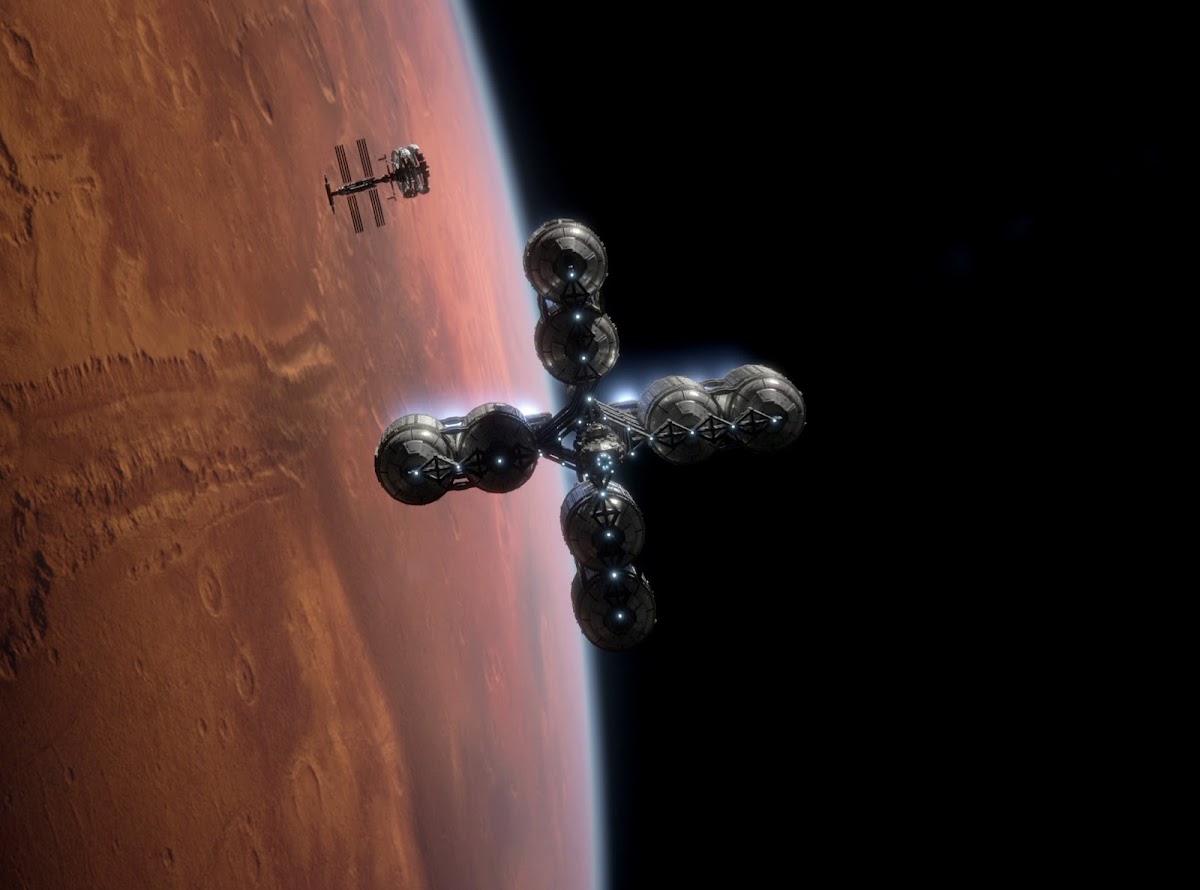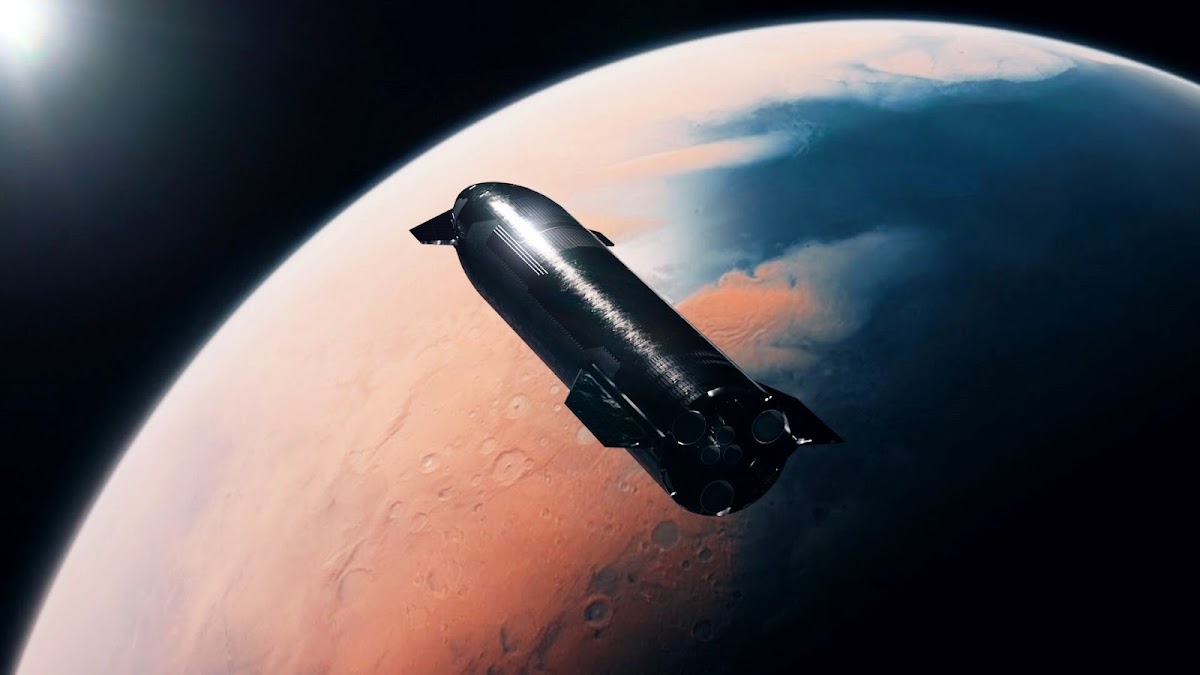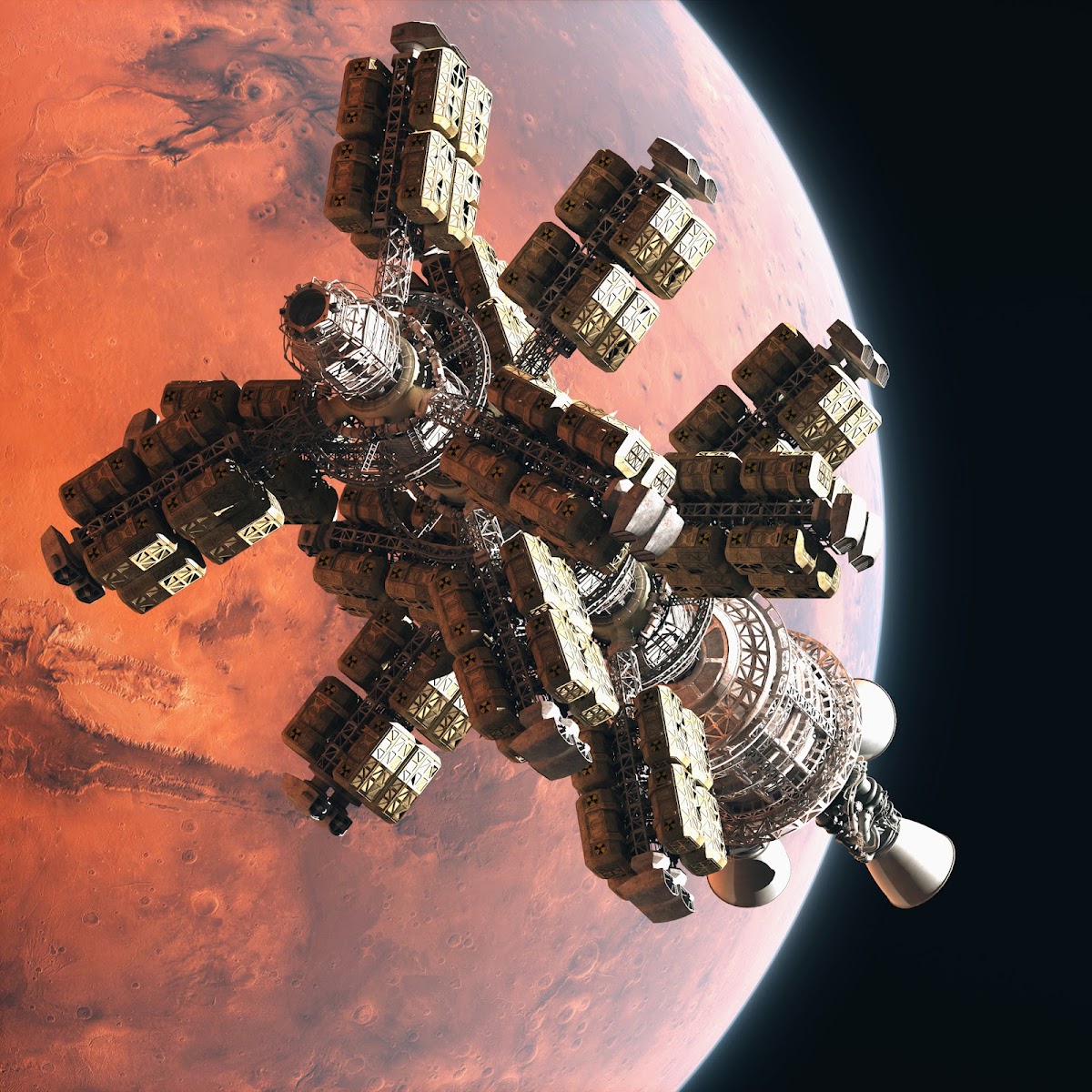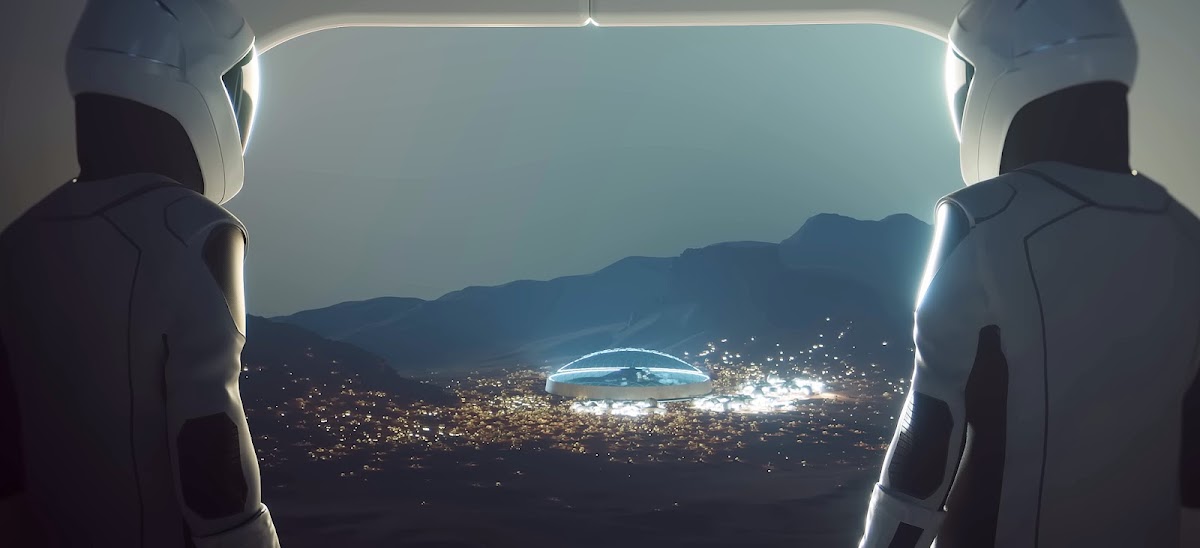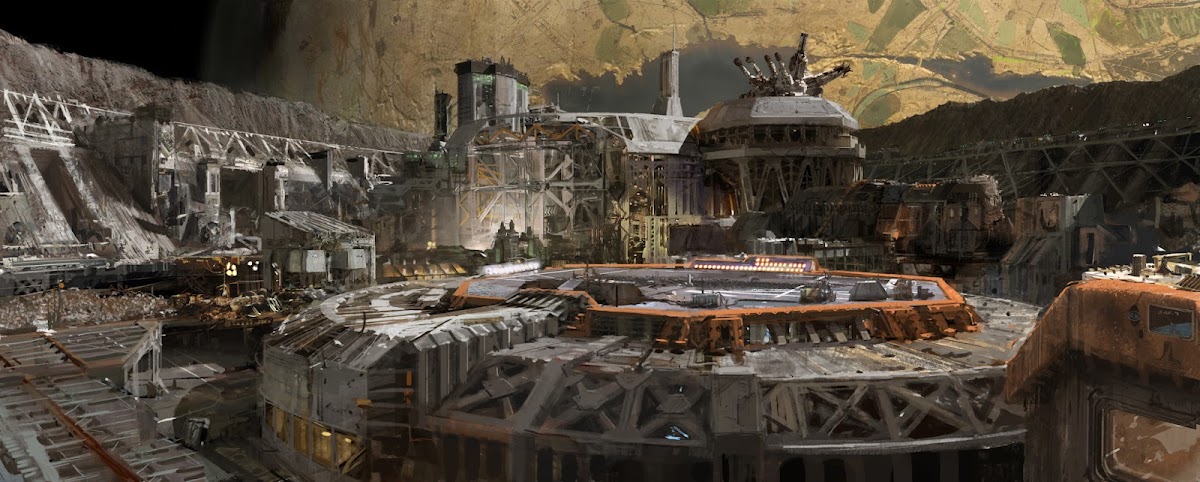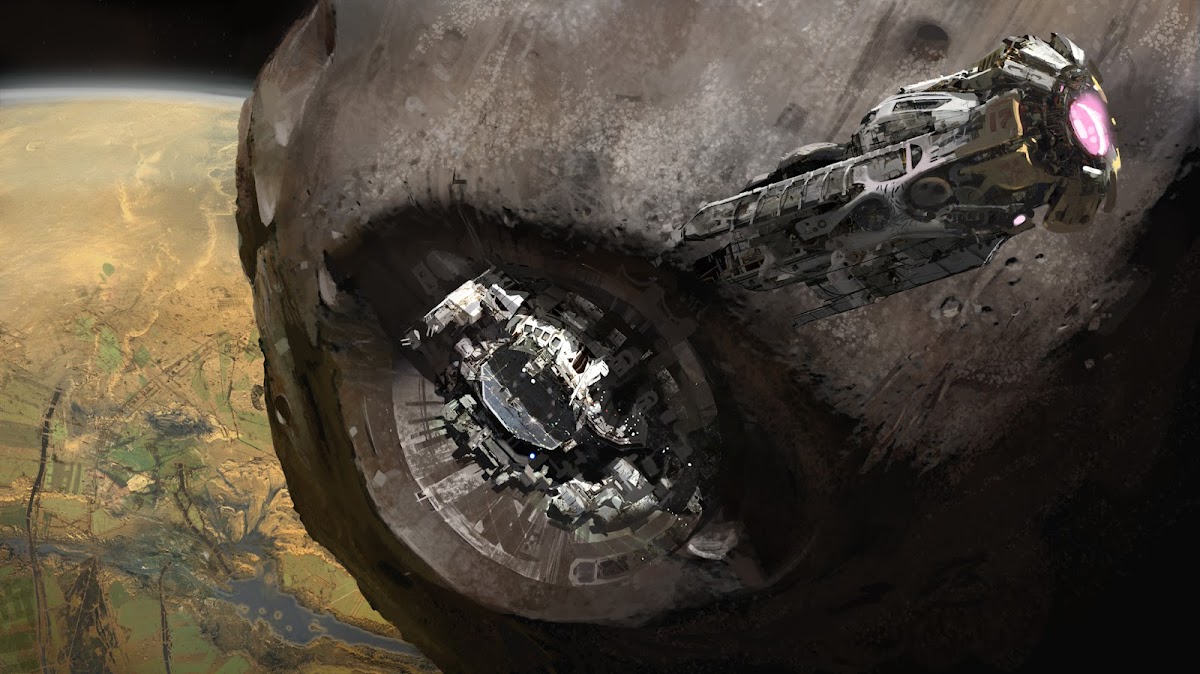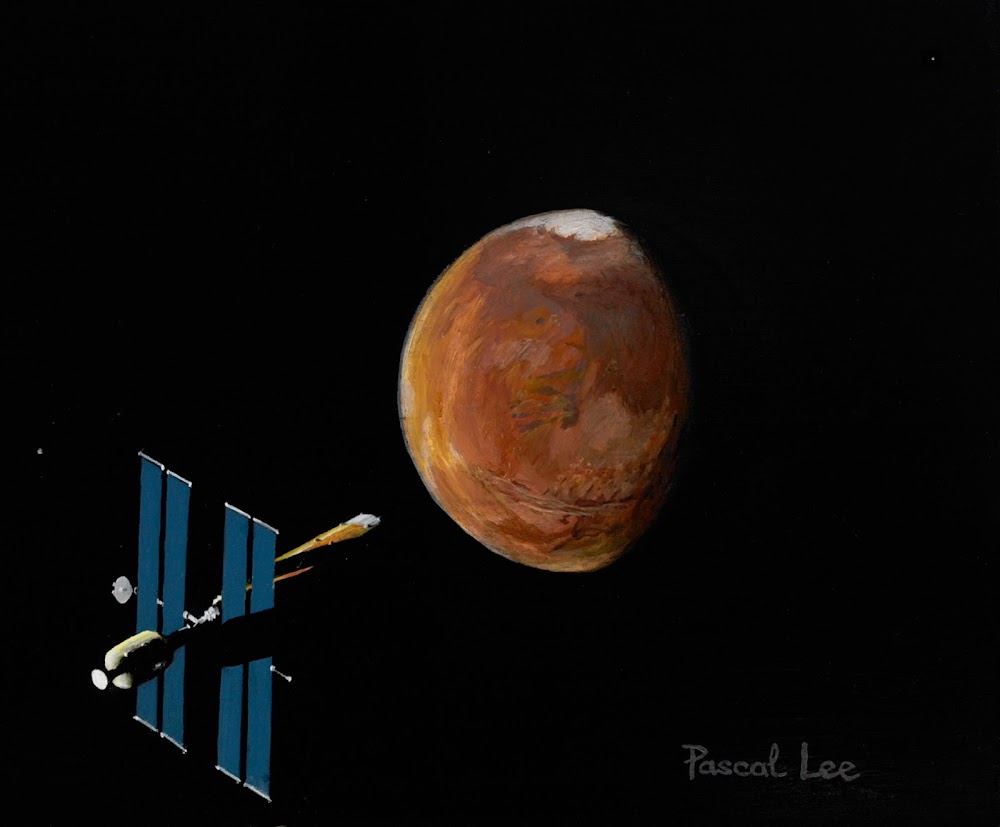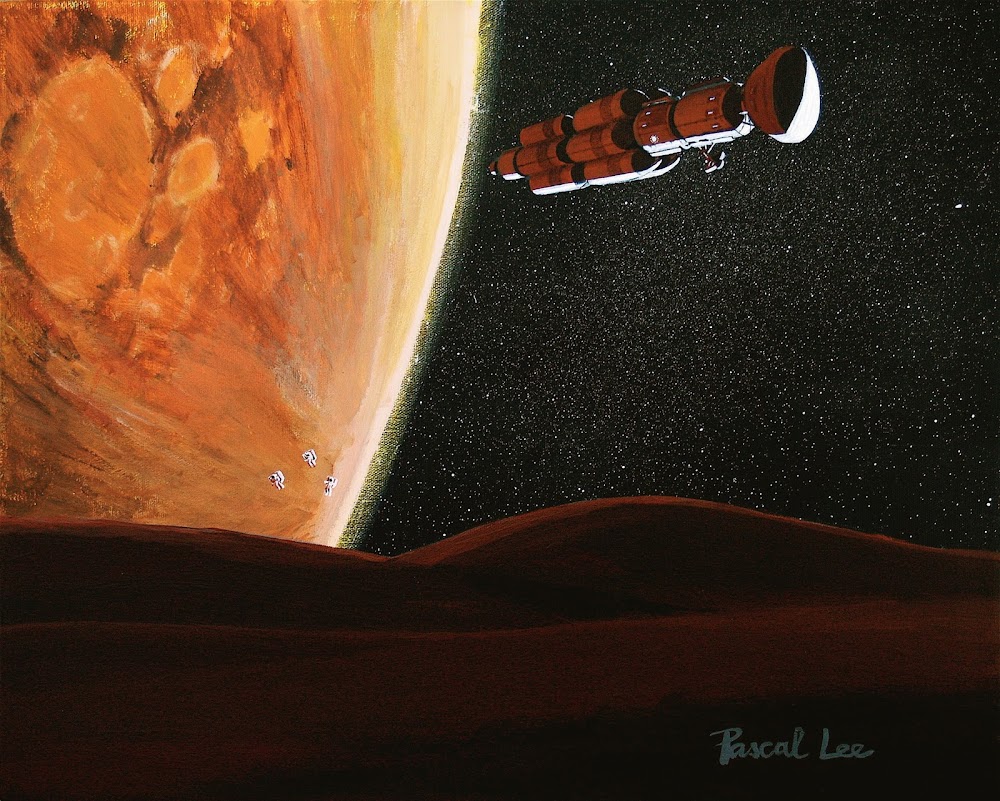Picture of the Day 02/11/2024 - Spaceship in orbit above Olympus Mons, the largest volcano in the Solar System, by British sci-fi and aviation artist Graham Gazzard (also known as GrahamTG).
Showing posts with label Mars orbit. Show all posts
Showing posts with label Mars orbit. Show all posts
Saturday, November 2, 2024
Sunday, September 1, 2024
Terraformed Mars by Mark Garlick
Picture of the Day 01/09/2024 - a FHD wallpaper (1920 x 1080) with a globe of terraformed Mars by British illustrator Mark Garlick. More of his art here.
Sunday, January 14, 2024
How to steal an asteroid .. "For All Mankind" season 4
It's possible our judgement is biased towards Mars-related content, but season 4 of For All Mankind alternate history sci-fi TV series is show's most exciting season yet. In season 4, depicting the alternate 2003, the international Happy Valley Base, founded in 1995 during season 3, has been significantly expanded and there are around 200 people living in it. We made a separate article with a large collection of high resolution shots depicting the exterior and interior of Happy Valley Base:
Mars base for 200 people in For All Mankind season 4
The main theme in season 4 is increasingly diverging visions for the purpose of human presence on Mars. For some it's only another contract job, but for others Mars is a new place to call "home". Add to the mix a once-in-a-lifetime opportunity to get hold on a large lithium-rich asteroid and increasingly strained relationships between the "upper class" (astronauts / cosmonauts, scientists and top executives) and contract workers literally living underground, and you have a recipe for a "Martian rebellion".
For All Mankind is exploring the idea of never ending space race if Soviets would have beaten US in the race for the Moon and the intention of the show is each season to jump about a decade further into the increasingly diverging reality of the show: in season 1, depicting alternate 1969 to 1974, both Soviets and US start building their separate bases near the lunar South pole; in season 2 (1983) both bases have been expanded and the superpowers compete for resources on the Lunar surface; in season 3 (1992 to 1995), Soviets and US are joined by a private company Helios and North Korea for a four way race to be first on Mars; in season 4 (2003) there is a sprawling international human base on Mars and an unexpected side enters the race to get hold on a large, lithium-rich asteroid for mining. You can watch the show on Apple TV+
Ahead there is a VISUAL RECAP OF SEASON 4, consisting of high resolution shots, downscaled from 4K UHD screens for better image quality. Be aware of heavy spoilers, revealing major story plots:
Mars base for 200 people in For All Mankind season 4
The main theme in season 4 is increasingly diverging visions for the purpose of human presence on Mars. For some it's only another contract job, but for others Mars is a new place to call "home". Add to the mix a once-in-a-lifetime opportunity to get hold on a large lithium-rich asteroid and increasingly strained relationships between the "upper class" (astronauts / cosmonauts, scientists and top executives) and contract workers literally living underground, and you have a recipe for a "Martian rebellion".
For All Mankind is exploring the idea of never ending space race if Soviets would have beaten US in the race for the Moon and the intention of the show is each season to jump about a decade further into the increasingly diverging reality of the show: in season 1, depicting alternate 1969 to 1974, both Soviets and US start building their separate bases near the lunar South pole; in season 2 (1983) both bases have been expanded and the superpowers compete for resources on the Lunar surface; in season 3 (1992 to 1995), Soviets and US are joined by a private company Helios and North Korea for a four way race to be first on Mars; in season 4 (2003) there is a sprawling international human base on Mars and an unexpected side enters the race to get hold on a large, lithium-rich asteroid for mining. You can watch the show on Apple TV+
Ahead there is a VISUAL RECAP OF SEASON 4, consisting of high resolution shots, downscaled from 4K UHD screens for better image quality. Be aware of heavy spoilers, revealing major story plots:
During season 4 interplanetary ships don't land directly on Mars; instead they dock to Phoenix, orbiting Mars, and the rest of the trip is made via small shuttles heading down to the surface:
Ed and Svetlana flying the asteroid capture ship Ranger:
Season 4 starts with an unsuccessful asteroid capture mission:
Monday, October 23, 2023
International Mars Orbital Station - Part 2 of Martian sketches by Andrey Maximov
 Environment concept artist Andrey Maximov from Armenia has created an impressive set of artworks called Martian sketches depicting a "routine" journey to Mars in 2089. So far he has published 25 pages of those sketches. As the artist describes them: "this series is kind of like the road sketches of a member of an expedition to Mars. It's a routine flight in the not-too-distant future. The planet is more or less inhabited. We have an orbital station around Mars. There are already several settlements on the surface, mining is going on."
Environment concept artist Andrey Maximov from Armenia has created an impressive set of artworks called Martian sketches depicting a "routine" journey to Mars in 2089. So far he has published 25 pages of those sketches. As the artist describes them: "this series is kind of like the road sketches of a member of an expedition to Mars. It's a routine flight in the not-too-distant future. The planet is more or less inhabited. We have an orbital station around Mars. There are already several settlements on the surface, mining is going on."
1st part (10 sketches) of Andrey's Martian sketches depicted the expedition leaving Earth.
Here is 2nd part (5 sketches) depicting expedition's arrival to International Mars Orbital Station:
Sunday, October 8, 2023
Colonized Mars - Martian city lights from space
How would a colonized Mars appear from space? Here is a FHD wallpaper with lights of two large cities on Mars as they would be seen from space; created by an uncredited artist for the Mars City Design platform:
Friday, September 22, 2023
SpaceX Starship orbiting terraformed Mars by Erik Corshammar
Saturday, August 5, 2023
'The World of Tomorrow' (1980) book cover
In his popular science book "The World of Tomorrow", first published in 1980, Robin Kerrod depicted life as it might look in the 21st century. Today, living in the third decade of the 21st century, this depiction might seem overly technologically optimistic (like most past attempts to depict the future), but the book contains many illustrations that positively inspired a whole generation of children. Here, for example, book's cover illustration shows a spacecraft that has landed on Phobos, near a human base:
Saturday, June 10, 2023
Cargo spaceship orbiting Mars by Graham Gazzard
Picture of the Day 10/06/2023 - Cargo spaceship orbiting Mars by British sci-fi and aviation artist Graham Gazzard (known also as GrahamTG).
Tuesday, April 11, 2023
SpaceX Starship landing on Mars - 4K UHD renders from Elon's Starship update 2022
When SpaceX CEO and lead designer Elon Musk gave his latest Starship update in February 2022, the presentation contained an animation of Starship's mission to Mars with a landing at Mars Base Alpha in the end. Today SpaceX finally gave public access to 4K UHD version of that animation. Here are some images from it.
Starship landing at Mars Base Alpha:
Click HERE for 4K UHD resolution
Click HERE for 4K UHD resolution
Click HERE for 4K UHD resolution
Starship approaching Mars:
Click HERE for 4K UHD resolution
Saturday, February 11, 2023
Terraformed & colonized Mars as it would be seen from space
Terraformed and colonized Mars as it would be seen from Phobos, the closest of two natural Martian moons, by British illustrator Mark Garlick. More of his art here.
Sunday, January 22, 2023
Martian city lights from space
Two FHD wallpapers (1920 x 1080) with the city lights of a large city on Mars as they would be seen from space. The images were created by an uncredited artist(s) for HP's "Mars Home Planet" rendering challenge in 2018 inviting participants "to imagine, create and virtually experience a sophisticated civilization on Mars. A new home for one million humans."
Sunday, November 20, 2022
Terraformed Mars from human base on Phobos by David A. Hardy
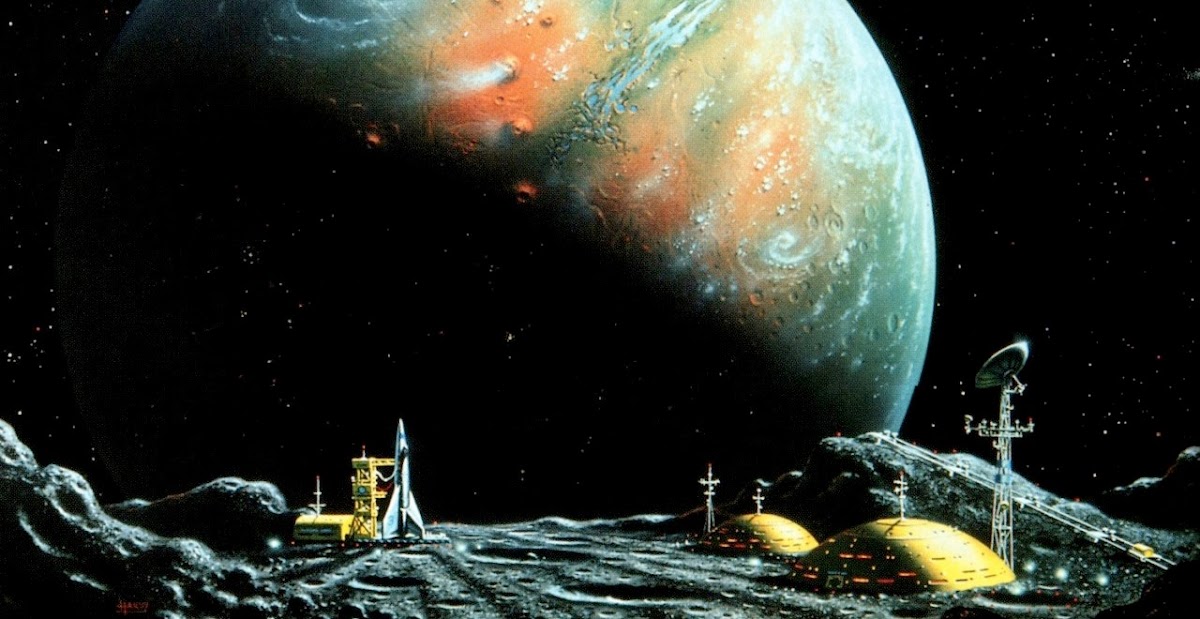 In 1994 the famous British space artist David A. Hardy created several retrofuturistic illustrations of a human base on Phobos, the closest of two natural Martian moons, in front of a terraformed Mars. The illustrations were created as cover art for two separate books. More of Hardy's Mars art here.
In 1994 the famous British space artist David A. Hardy created several retrofuturistic illustrations of a human base on Phobos, the closest of two natural Martian moons, in front of a terraformed Mars. The illustrations were created as cover art for two separate books. More of Hardy's Mars art here."Terraforming Mars" as cover art for Arthur C. Clarke's book "The Snows of Olympus" (1994):
"Terraformed Mars" as cover art (there are several slightly different versions of this illustration) for Carl Sagan's book "Pale Blue Dot: A Vision of the Human Future in Space" (1994):
Sunday, May 1, 2022
How we will travel beyond Mars - shortfilm by Erik Wernquist
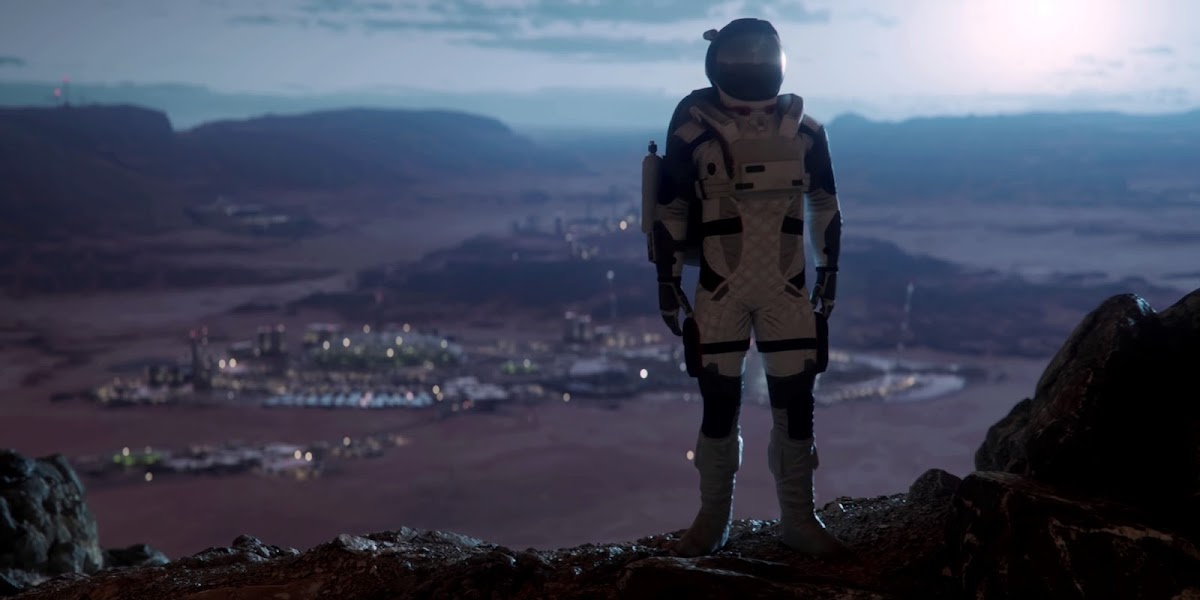 Swedish digital artist Erik Wernquist, the author of the stunning shortfilm "Wanderers" which depicts a vision of humanity's expansion into the Solar System, has created another inspirational shortfilm "Go Incredibly Fast" "to identify a few propulsion approaches we might utilize to send humans to the worlds in our Solar System beyond Mars and reach out across the vast distances between stars."
Swedish digital artist Erik Wernquist, the author of the stunning shortfilm "Wanderers" which depicts a vision of humanity's expansion into the Solar System, has created another inspirational shortfilm "Go Incredibly Fast" "to identify a few propulsion approaches we might utilize to send humans to the worlds in our Solar System beyond Mars and reach out across the vast distances between stars."
Here you can watch the shortfilm and see some Mars-related images from it:
Astronaut in front of Mars colony:
Space station orbiting Mars:
Sunday, January 30, 2022
Spaceport on Phobos (concept art for Aliens: Colonial Marines)
Digital paintings of a spaceport on Phobos, the closest of two natural Martian moons. These images are concept art for Aliens: Colonial Marines (2013) - a first-person shooter (FPS) game set in the universe of Alien franchise. Unfortunately this location didn't make to the final game release.
In Alien's universe (depicted in Alien, Predator & Prometheus movies, games and books) Mars is the first planet colonized by humans in mid-21st century. There are many colonies and military bases on the planet established by both national and commercial entities and housing millions of people. On Phobos there is a commercial research facility experimenting with xenomorphs or aliens - a highly aggressive endoparasitoid extraterrestrial species.
In Alien's universe (depicted in Alien, Predator & Prometheus movies, games and books) Mars is the first planet colonized by humans in mid-21st century. There are many colonies and military bases on the planet established by both national and commercial entities and housing millions of people. On Phobos there is a commercial research facility experimenting with xenomorphs or aliens - a highly aggressive endoparasitoid extraterrestrial species.
Spaceship leaving Phobos' spaceport. Note the partially terraformed Mars below:
Sunday, November 28, 2021
Human mission to Martian moons Phobos and Deimos by Pascal Lee
 Over the years planetary scientist, the director of Haughton-Mars Project, Pascal Lee has created a set of paintings depicting human mission to the Martian moons Phobos and Deimos. Here are several of them. More of his Mars related paintings here.
Over the years planetary scientist, the director of Haughton-Mars Project, Pascal Lee has created a set of paintings depicting human mission to the Martian moons Phobos and Deimos. Here are several of them. More of his Mars related paintings here.
Spaceship approaching Mars with Phobos and Deimos in sight:
Landing on Deimos, the farthest and smallest of the two Martian moons:
Astronauts exploring Deimos:
Landing on Phobos, the closest and largest of the two Martian moons:
Friday, September 17, 2021
Mars base in Civilization 6 strategy game
Civilization 6 (Sid Meier's Civilization VI) is a turn-based strategy game released in 2016. The goal for the player is to develop a civilization from an early settlement through many in-game millennia to become a world power and achieve one of several victory conditions. One of the paths to win the game is through science domination where you need to be the first to launch a satellite, land humans on the Moon and establish a Martian colony.
Spaceship approaching Mars to establish a colony there:
Full in-game cinematic for science victory:
Sunday, August 15, 2021
Domed park on a space station orbiting Mars
 Picture of the Day 15/08/2021 - domed monumental park on a gigantic space station orbiting Mars by concept art and visual development house West Studio.
Picture of the Day 15/08/2021 - domed monumental park on a gigantic space station orbiting Mars by concept art and visual development house West Studio.
Friday, February 12, 2021
Spaceport on Phobos by Thomas Peters
Picture of the Day 12/02/2021 - Spaceport on Phobos, the closest of two natural Martian moons, by graphic designer and illustrator Thomas Peters (Drell-7). More of his space art here.


Wednesday, August 26, 2020
SpaceX orbital shuttle concept by Rodrigo Magro
SpaceX is developing its Starship Super Heavy two-stage super heavy-lift launch vehicle for interplanetary flights. But, if you would need a flight only between the surface of Mars, Moon or other similar planetary body and its orbit, you could do it by less powerful spacecraft - an orbital shuttle.
Here is a concept of such spacecraft, called SpaceX Starflight, by Spanish transportation designer Rodrigo Magro. The orbital shuttle would have a lifting-body shape with thermal shield on the windward side, two forward winglets as Starship, four lower fins with landing legs and solar panels, large panoramic window and hypergolic auxiliary engines for landing on the Moon and other smaller planetary bodies.
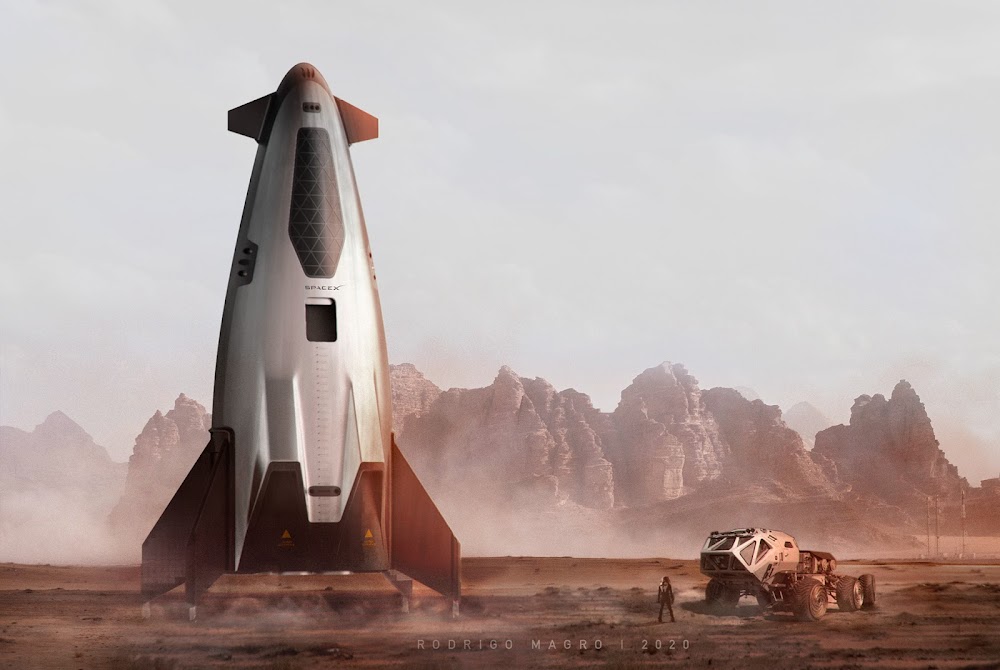
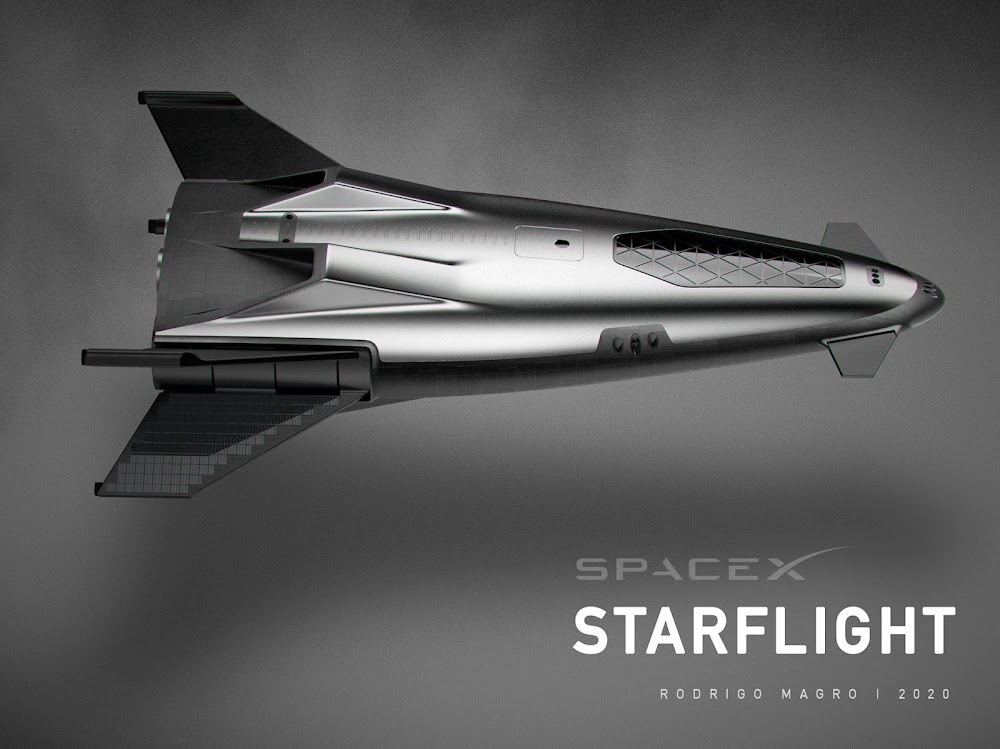
Here is a concept of such spacecraft, called SpaceX Starflight, by Spanish transportation designer Rodrigo Magro. The orbital shuttle would have a lifting-body shape with thermal shield on the windward side, two forward winglets as Starship, four lower fins with landing legs and solar panels, large panoramic window and hypergolic auxiliary engines for landing on the Moon and other smaller planetary bodies.


Monday, June 29, 2020
SpaceX orbital station above terraformed Mars by Encho Enchev
Picture of the Day 29/6/2020 - Concept art for SpaceX's orbital station above partly terraformed Mars by Encho Enchev from Ubisoft. More of his concept art here.
Subscribe to:
Posts (Atom)







